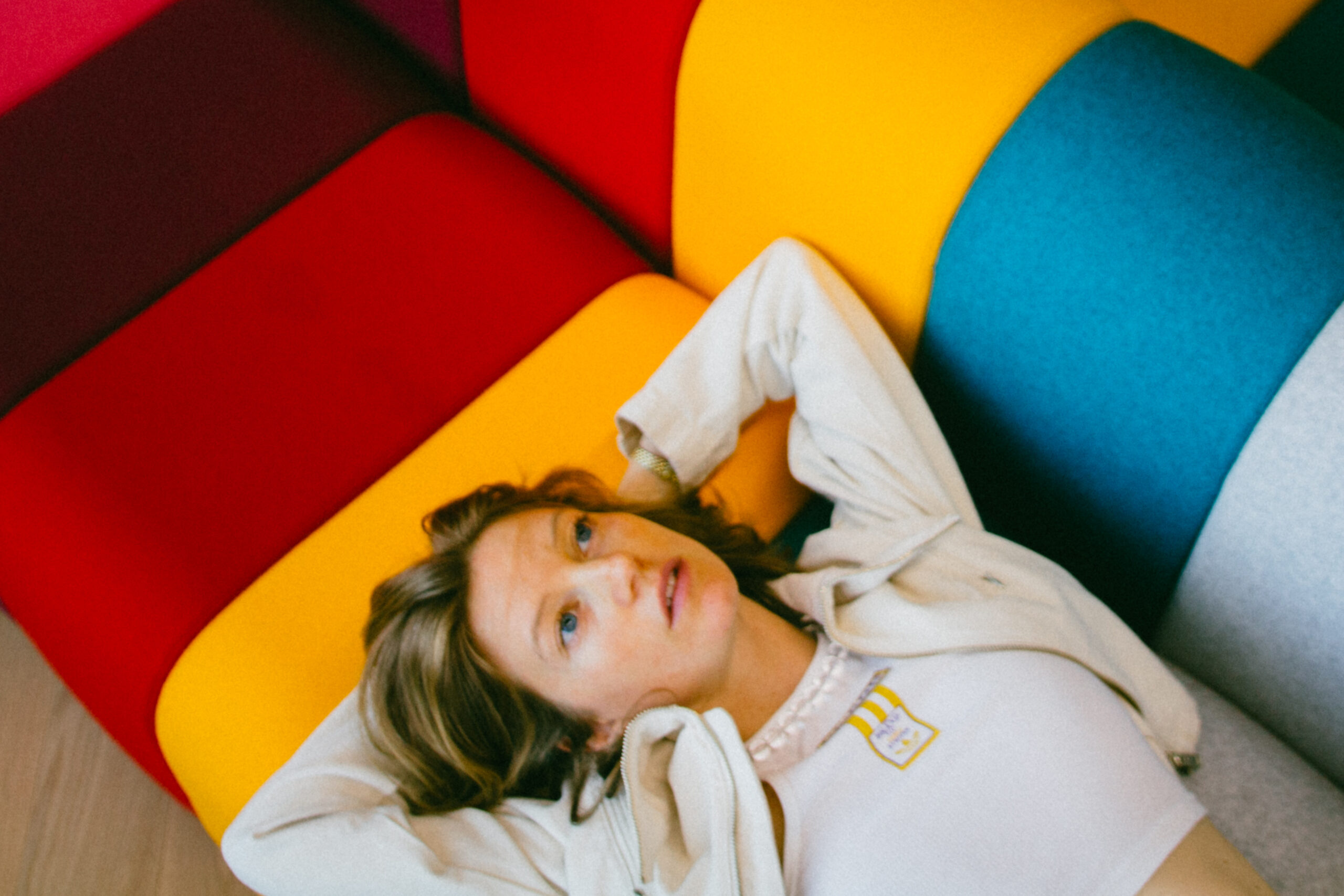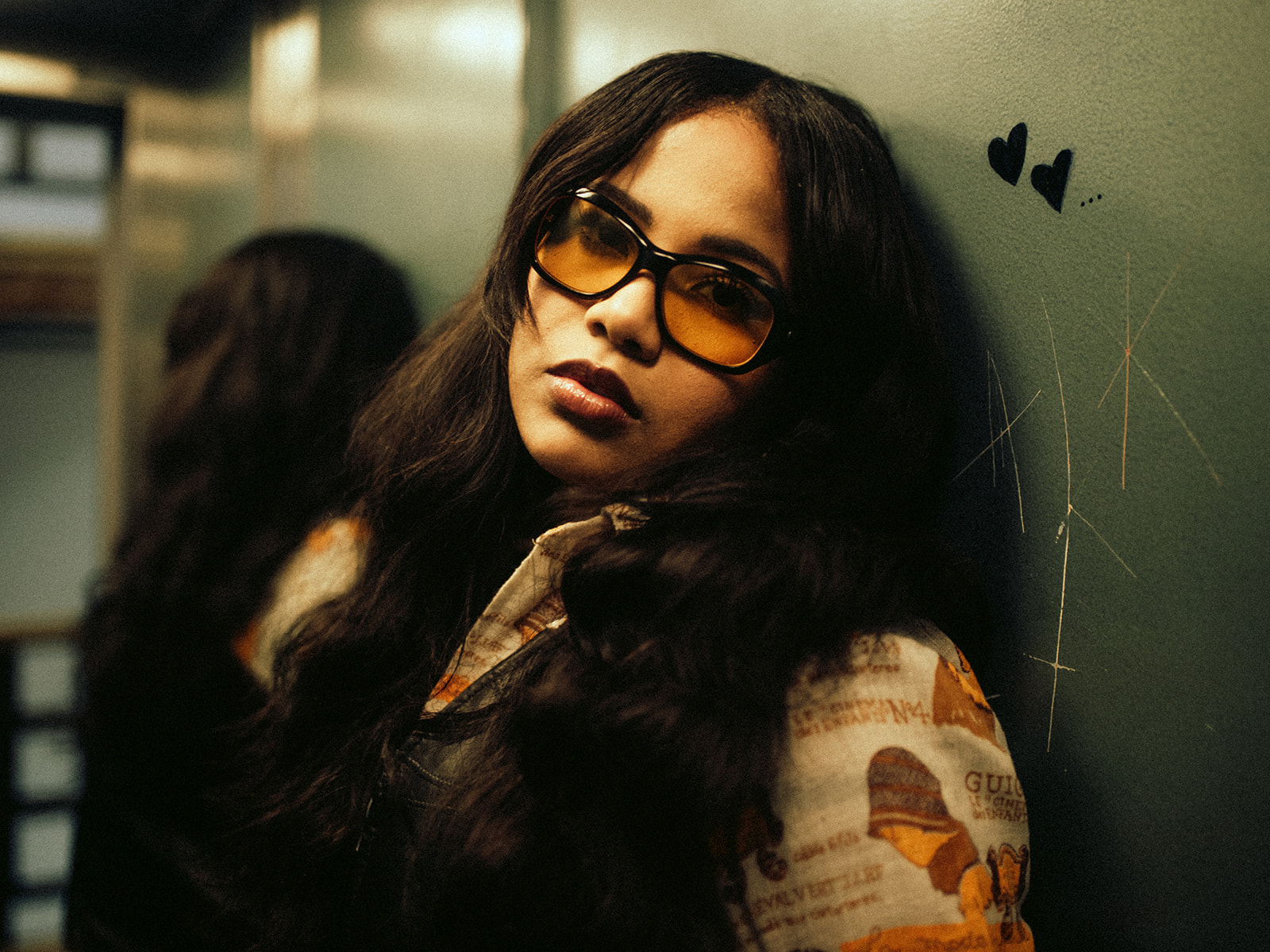Foto-© Ebenezer Abebe
Baby Rose hat mit der Veröffentlichung ihres Albums Through and Through am vergangenen Freitag erneut gezeigt, was es bedeutet, großartige Musik zu kreieren. Die elf Tracks der in den USA-lebenden Künstlerin sind eine unglaubliche Darstellung ihrer starken Stimme. Wir haben sie über Zoom getroffen und unter anderem über ihre Zusammenarbeit mit Smino, das Thema Perfektion und ihren Platz in dieser Welt gesprochen.

I’m gonna dive right into it. The persona or image of an artist is often very different from what artists actually are like. Would you say Jasmine is different from Baby Rose? Do you try to separate your artist being from your personal self or is it all a blur at this point?
I don’t know that there’s so much a persona as I just tend to be way more dramatic in my music than how I would react in real life. In real life, I try to keep things calm and peaceful and not really leaning to things that I feel like doing, you know? I may feel one way, but I may act a completely different way, more chill and and calm. But in my music, I kind of let scenarios play out in a way that I wish I could do in real life without consequence… it’s a form of expression where I can kind of unleash my fear, my desires, all of that. At the end of the day, I’m reflecting on a situation that I’ve experienced in real life just with the perspective that’s more boundless.
Yeah, it makes total sense. Because in the end, probably through your music, you then also process obviously certain things and so it kind of goes hand in hand. But there’s always a difference, some artists have like two different sides and then some are just exactly the same. Speaking a little more about your new album, how would you describe Through and Through in three words?
Patience, gratitude and sacrificial.
Patience is always an important one.
It took a lot of patience to get to this point and a lot of sacrifice. A lot of things fell off along the way and rearranged themselves—fell into place. Like as much as I was writing in the middle of the storm, you know, we we were in a space of uncertainty… I feel like that only made it more more stronger, it made it more visceral. We didn’t know what would happen. We didn’t know how it happened. And so I was like, let’s just pour everything into this and let it serve as like an offering, you know?
How long have you worked on this album?
We started while I was doing To Myself. I think Love Bomb is the oldest record on that and that was done in early 2019. And so we’ve been working on the album since the beginning of 2019.
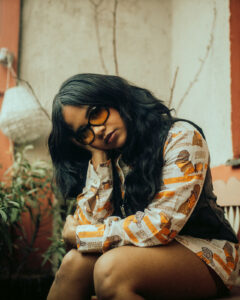 That’s a very long time. And considering also, as you said, so much has happened. The whole world was in a very weird, different situation. So I feel like in a creative way, as well as in a personal way, there must have been a lot of adjusting to different situations, which might have made the process very different to before?
That’s a very long time. And considering also, as you said, so much has happened. The whole world was in a very weird, different situation. So I feel like in a creative way, as well as in a personal way, there must have been a lot of adjusting to different situations, which might have made the process very different to before?
Absolutely. It was definitely an art of adjusting and pivoting and also realising not to take things for granted. I was living in a space where I felt like everything was happening to me… I’m just writing this way that I don’t have any sense of control. But there was a freedom in that at the same time, because it was like ‘no one’s watching.’ Everyone’s at home—we’re in a state of just being suspended in time. It gave this sense of freedom to just go crazy. And we kept documentaries on in the studio, like other artists and their process that we looked up to like the Beatles or Jimi Hendrix, Janis Joplin and all of these people doing their thing and being very free in it. Because in a way, I romanticise the fuck out of like the seventies or any time before social media to be honest. Because if you could take your time, you could have this sense of process that didn’t have to be for an audience like there was a point in time where you could just create and not worry about how the output would fit in the algorithm. And so that’s kind of where we were leaning into like, what is the Gilded Age of music and how can we draw from that to lift my music and evolve it. And so it was a bit of a looking at the past and also looking at where we were reading the room.

Fitting in algorithms and having a social media presence is a big thing and especially during the pandemic artists were seeking ways to be present despite not being able to connect personally with their fans, so there must have been a constant struggle to live up to that?
Absolutely. And… it continues to stay like this. I’ve had to realise that there’s a balance and it’s a tool at the end of the day. It’s just a very powerful tool that can be very consuming if you let it. But… it’s a tool to connect directly with people and let them know what it is and how I’m doing and how I do what I do.
How would you describe your journey from your debut album To Myself to this album now? What has happened in between in terms of character as well as creative development?
I would just say that I just started to expand my psyche around my career and what I want my legacy to be in that space. I really began thinking about—I know this is dark—but like if this is the last thing that I’m ever to leave behind, what I want it to sound like in that kind of there was a lot of shit going on in the US at the time, as if we were going back to the 1960s in the worst way; cops were killing black people and getting off and people were killing black people and getting off.
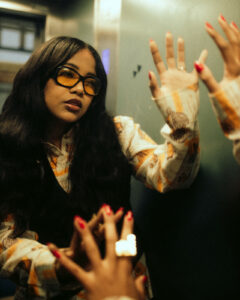 And there were marches and there were protests and it was like all of this in the middle of the pandemic. I studied sociology in school. I’ve always been interested in the way things are, why they are the way they are. And like certain people or companies in this industry, whether it be labels and the Academy and them making their statements really were interesting to me. Like their responses about “Oh yeah, we have…, we’re going admit that… Kind of like we do need black voices and all of these things etc” and so I was just like, I don’t know, I felt like on top of this internal intention that I had like if it’s the last thing I’m going to do, what is it going to sound like?
And there were marches and there were protests and it was like all of this in the middle of the pandemic. I studied sociology in school. I’ve always been interested in the way things are, why they are the way they are. And like certain people or companies in this industry, whether it be labels and the Academy and them making their statements really were interesting to me. Like their responses about “Oh yeah, we have…, we’re going admit that… Kind of like we do need black voices and all of these things etc” and so I was just like, I don’t know, I felt like on top of this internal intention that I had like if it’s the last thing I’m going to do, what is it going to sound like?
I also wanted to think beyond me for a moment and be like, let me think about the people that came before me. Let me think about the people that are going to come after me or the people that are right beside me that are already pushing out of this box that we seem to be placed in when it comes to R&B, when it comes to being a black artist in general, like being judged before you even hit a damn song. And so I just feel like I had this chip on my shoulder, when it comes to conveying my emotions, really go against the status quo and not in a way that was natural for me, but a way that felt like I need room to think, I need room to really say this with my whole heart and soul. And so records like Stop the Bleeding or Nightcap and Fight Club came from that energy of wanting to be boundless and not wanting to be places out of a box and having people to just have to deal with it. You’ll make a judgemental call however you will, but I am going to do what I do. And what I’m going to do is take up space.
As far as I know, you’ve created I won’t tell together with friends in the middle of the night, right?
Oh, yeah. I mean, it was just all of the songs were easy, to be honest. There was no song on this album that was forced. But with I won’t tell it was particularly interesting because it was like four in the morning. This was the first night I really got to work with Alissia, who was on bass. And yeah, it was a jam. Like I’m sitting in the middle of the floor with a mic, Dave is on drums, Tim is on organ, John is on guitar and Alissia is on bass and we’re just jamming. And then it came to that groove and I was like, damn let’s stay here. And then, you know, the switch has happened. And it was just like, it was really like a movie. Like when Queen made Another One Bites the Dust. Like when I saw that movie, it was giving that. We listen to it back and then I took that to another studio in Atlanta and I transcribed the words and laid it down very raw on a handheld mic. And it was what it was. But I like that song because I’m kind of just talking my shit. And I’m very like, you know, I really do feel like that. I feel like maybe in fame and my journey, it won’t lie with like all of the fame in the world. But if I’m paid like I’m good, like I love that for me, like I love being successful in ways of like film and all of the other ways in which an artist can get paid in 2023. And so I’m just following the journey, following the breadcrumbs. Who knows what lies for me. But I’ma have a good time and I’ma keep my integrity.
I wanted to ask you whether there was any track that took like an unusual amount of time compared to that. But you’ve been saying that it’s just been quite easy to go through, which probably also speaks for that. You’ve just done what felt right for you. And of course there’s also Smino on that track. One of only two features on your album, right? Why Smino? How did you two meet and how did the whole collaboration go?
Well, Smino is somebody who’s like, I feel, definitely in his own lane and his own world in hip hop and all of that space and so real recognize real. Like I’m somebody that’s kind of an outlier in my sonic space or wherever I’m at. And so I really wanted him to do his thing on it. And when he heard it and he was excited, I knew I made the right choice, so he went crazy. Like I just sent the record and he sent it back and that was what it was like. I’m always excited to collaborate with people who are unafraid to just be very expressive and push themselves. And that’s who he is to me.

That’s cool. And are you generally very selective about who you are collaborating with. I mean, of course there needs to be, like you say, that kind of connection in a way like someone who expresses himself without fear. But when you approach artists, is there any specific way you go about it? And do you have like an ideal collaborator?
Oh, honestly it’s been a very awesome journey so far as far as meeting people who I admire and just want to give them their flowers and also be able to talk about things like real conversations if I need real advice and things like that. But it’s been a mutual respect in a lot of instances like meeting James Blake or SZA or Kehlani, and a couple of other people and now that I live in L.A., I’ve been able to really show up for people like Destin Conrad and folks that are just like native to L.A. or whatever, or Jordan Ward who be here all the time. And I think that while we’re on this journey it’s cool to be able to look to the left and right and not feel so alone and I know in my mind I want to push things forward. I want to see live music, be the precipice, and not just the music where you got the track playing behind the music and like you’re doing the bare minimal.
I’m talking about real shows. Like Monterey Pop Festival 1967 where we heard Janis Joplin for the first time and a lot of these other bands and like people just really giving their all to it. And so I’m blessed to be in a time where I’m starting to see all of that come to the forefront and like all of the genre bending black artists and it’s cool to feel seen and to be able to talk about the things that we do and and all of that. So there’s a lot of people that I wish to collaborate with.
Whether you work with someone else or on your own. Perfection is a big topic in any creative field, how have you managed it creating this album, like how did you determine the moment where you said “this is good now as it is and ready”?
Yeah, absolutely. With a lot of time, like I do well under pressure in a sense that I will twindle with things until the very last minute. I had a lot of time to work on post production, which I didn’t have with To Myself or any other album I’ve ever put out. And so that led me to kind of overproducing sometimes like having to listen back to the original versions and feeling like “Oh this is better”. And so adding things, taking them away and so on and so forth, but being in the mixing process, in the master process, having that glaze of like that tape master. I knew it was as done as it’s going to be, you know, and that I’ve gotten it as far as I can take it and I’m really proud of where everything is landed. I’m really proud that we were able to take our time and it definitely is an evolution.
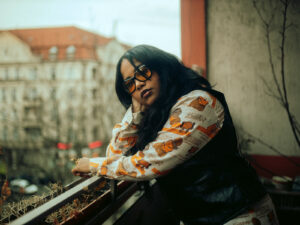 I was looking at your artwork and I noticed that it’s mostly red. Do you ever connect your songs with colours and if yes, would you say that red describes the mood best or is it completely coincidental?
I was looking at your artwork and I noticed that it’s mostly red. Do you ever connect your songs with colours and if yes, would you say that red describes the mood best or is it completely coincidental?
Red is just a very stark color for me, and I think that it represents fire. It represents chaos. I do have that whole thing, when you can see colors as you are creating. I like the red. I’m a fire sign, so I just resonate a lot with fire. When I’m ready to let go of some shit, I burn it, I write a note and I put it in fire and I let it go. And so being in this red space, it’s not something that I wear often. I’m usually in very muted, calm colors in real life.
This is again the artist vs your private self you were mentioning earlier.
Yes! But red is like a statement. I think that it serves its purpose well on the album cover.
Is there like any song on the album where you’d say that it speaks best for this whole project?
I don’t think there’s an all encompassing song. Every song represents a space and the journey. Because if I was to say like Power, then that’s not playing on the themes of all of the ones beforehand. And Tell Me It’s Real, Dance With Me and Stop The Bleeding or Nightcap like there’s a lot of balance of yin and yang throughout the album. And so it needs both sides to tell the full story.
On Stop The Bleeding you say “how do I stop repeating the cycle of self-sabotage”. What’s the background of this track?
It definitely spans. It’s my own behavior, but it’s also like generational cycles, like watching people before me. Things that were self-sabotaging, you know, and thinking that that’s the way to go. Or like me being in my own childhood, kind of like tracing back certain things that I do as an adult now. I learned that because I was just trying to protect myself or not get too deep in something because I don’t want to be hurt or abandoned in the end. And it’s like this song is kind of like a splash of cold water where I’m like “enough is enough”. Like, I get that this has been a running theme in my life. I get it that it’s taken years and years for me to get to this place, but I’m willing to patiently undo this. I’m willing to take my time to undo this because I can’t live like this, like I can’t love like this. I can’t move in life being my highest self, being the best version of me in this with this cycle constantly playing and me telling myself “Oh, I don’t deserve this, this is going to end soon”. I like trying to break my fall and so Stop The Bleeding is definitely like a climax to the album and it represents me just really wanting to come out of a cycle and really not blaming anybody else for how I got here, but looking inside and saying, you know, I’m responsible for what I do and how I move.
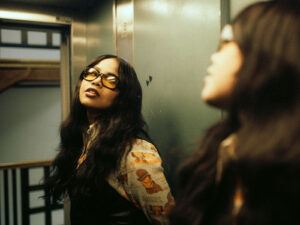 You gonna go on tour with Q, how come you two decided to join forces and go on tour?
You gonna go on tour with Q, how come you two decided to join forces and go on tour?
Well, Q has always been my homie and I’ve always supported him and he’s always supported me. And both of our albums are coming within a week of each other. And so I think that in this time, you know, reading the rule of where we are in the world like we’re all opening back up, everybody is outside, tours are in full swing. And we both are very adjacent messaging in the intention of our album. So it felt really good to be able to get together and do this with him and give people a real experience that they can walk away and feel like, damn. The shape of music is changing, like the sonics in R&B and wherever, like in black music is just shifting and raising. Like he’s got an iconic album on the way. My album is very all encompassing and giving a little bit of everything. And I just feel like for us to band together and all, I rarely see a woman and a man do a co-headlining too, but that especially like our albums are kind of traversing the whole gender norms.
I just feel like it’s so incredibly special to be able to give this. And that tour is very aptly named, you know Through The Soul. His is soul, PRESENT, mine is Through and Through. It’s just a very special, transcendental experience that we’re being able to give both of our fans and also share fans like, if you’re a fan of me, you’ll fuck with Q, if you’re a fan of Q you fuck with me probably. So it just makes sense, you know?
Are we also going to get to see you both in Europe/Germany together?
Oh, yeah. And we’re definitely going to come because it just makes sense. It makes sense for both of us. You know, our audiences are huge over there and I just haven’t been over there in a minute to perform. I want to be able to really just stay and perform again. It’s been too long.









